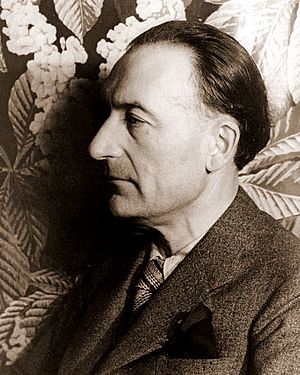Jules Romains facts for kids
Quick facts for kids
Jules Romains
|
|
|---|---|

Jules Romains, photo taken
by Carl Van Vechten, 1936 |
|
| Born | Louis Henri Jean Farigoule 26 August 1885 Saint-Julien-Chapteuil in the Haute-Loire |
| Died | 14 August 1972 (aged 86) Paris |
| Occupation | Poet and writer |
| Language | French |
| Education | lycée Condorcet École normale supérieure |
| Literary movement | Unanimism |
| Notable awards | elected to the Académie française |
|
|
|
| Signature |  |
| President of PEN International |
|
| In office October 1936 – October 1941 |
|
| Preceded by | H. G. Wells |
| Succeeded by | Wartime International Presidential Committee (1941–47) |
Jules Romains (born Louis Henri Jean Farigoule; 26 August 1885 – 14 August 1972) was a French poet and writer and the founder of the Unanimism literary movement. His works include the play Knock ou le Triomphe de la médecine, and a cycle of works called Les Hommes de bonne volonté (Men of Good Will). Sinclair Lewis called him one of the six best novelists in the world.
He was nominated for the Nobel prize in literature sixteen times.
Contents
Life
Jules Romains was born in Saint-Julien-Chapteuil in the Haute-Loire but went to Paris to attend first the Lycée Condorcet and then the prestigious École Normale Supérieure. He was close to the Abbaye de Créteil, a utopian group founded in 1906 by Charles Vildrac and René Arcos, which brought together, among others, the writer Georges Duhamel, the painter Albert Gleizes and the musician Albert Doyen. He received his agrégation in philosophy in 1909.
In the interwar years, he pleaded the cause of pacifism and a united Europe against incipient fascism and despotism. In 1927, he signed a petition (that appeared in the magazine Europe on 15 April) against the law on the general organization of the nation in time of war, abrogating all intellectual independence and all freedom of expression. His name on the petition appeared with those of Lucien Descaves, Louis Guilloux, Henry Poulaille, Séverine... and those of the young Raymond Aron and Jean-Paul Sartre from the École normale supérieure.
His novel The Boys in the Back Room (Les Copains, literally "the pals") appeared in English in 1937.
During World War II he went into exile first to the United States where he spoke on the radio through the Voice of America and then, beginning in 1941, to Mexico where he participated with other French refugees in founding the Institut Français d'Amérique Latine (IFAL).
A writer on many varied topics, Jules Romains was elected to the Académie française on 4 April 1946, occupying chair 12 (of 40). He served as President of PEN International, the worldwide association of writers from 1936 to 1941. In 1964, Jules Romains was named citizen of honor of Saint-Avertin. Following his death in Paris in 1972, his place in the Académie française was taken by Jean d'Ormesson.
He was criticized by writer and politician Aimé Césaire in the 1950 essay Discourse on Colonialism for racist statements by the title character of his novel Salsette Discovers America: "[...] I will not even censure our Negroes and Negresses for chewing gum. I will only note...that this movement has the effect of emphasizing the jaws, and that the associations which come to mind evoke the equatorial forest rather than the procession of the Panathenaea....The black race has not yet produced, will never produce, an Einstein, a Stravinsky, a Gershwin."
Unanimism
Jules Romains is remembered today, among other things, for his concept of Unanimism and his cycle of novels in Les Hommes de bonne volonté (The Men of Good Will), a remarkable literary fresco depicting the odyssey over a quarter century of two friends, the writer Jallez and politician Jerphanion, who provide an example in literature of Unanimism.
Romains originally considered unanimism to mean an opposition to individualism or to the exaltation of individual particularities, universal sympathy with life, existence and humanity. In later years, Romains defined it as connected with the end of literature within "representation of the world without judgment", where his social ideals comprise the highest conception of solidarity as a defense of individual rights. His first book was La vie unanime, published in 1904, and in the preface to Men of Goodwill he identified the ideas in it as essentially the same as those of that later work.
Works
- Men of Goodwill (Les Hommes de bonne volonté, 1932-1946; 27 volumes Paris: Calmann Lévy)
- The body's rapture (Psyche), London: John Lane, 1933
- Salsette Discovers America, New York: Knopf, 1942
- Tussles with time (Violation de Frontières, 1951), London: Sidgwick & Jackson, 1952
- The Death of a Nobody (Mort de quelqu'un, 1911)
Filmography
- Knock, directed by René Hervil (1925, based on the play Knock)
- Knock ou le triomphe de la médecine, directed by Roger Goupillières and Louis Jouvet (1933, based on the play Knock)
- Donogoo Tonka, directed by Reinhold Schünzel (1936, based on the play Donogoo)
- Donogoo, directed by Reinhold Schünzel and Henri Chomette (1936, based on the play Donogoo)
- Dr. Knock, directed by Guy Lefranc (1951, based on the play Knock)
- Les Copains, directed by Yves Robert (1965, based on the novel Les Copains)
- Knock, directed by Lorraine Lévy (2017, based on the play Knock)
Screenwriter
- The Portrait (1923), directed by Jacques Feyder (1923)
- Volpone, directed by Maurice Tourneur (1941)
See also
 In Spanish: Jules Romains para niños
In Spanish: Jules Romains para niños

